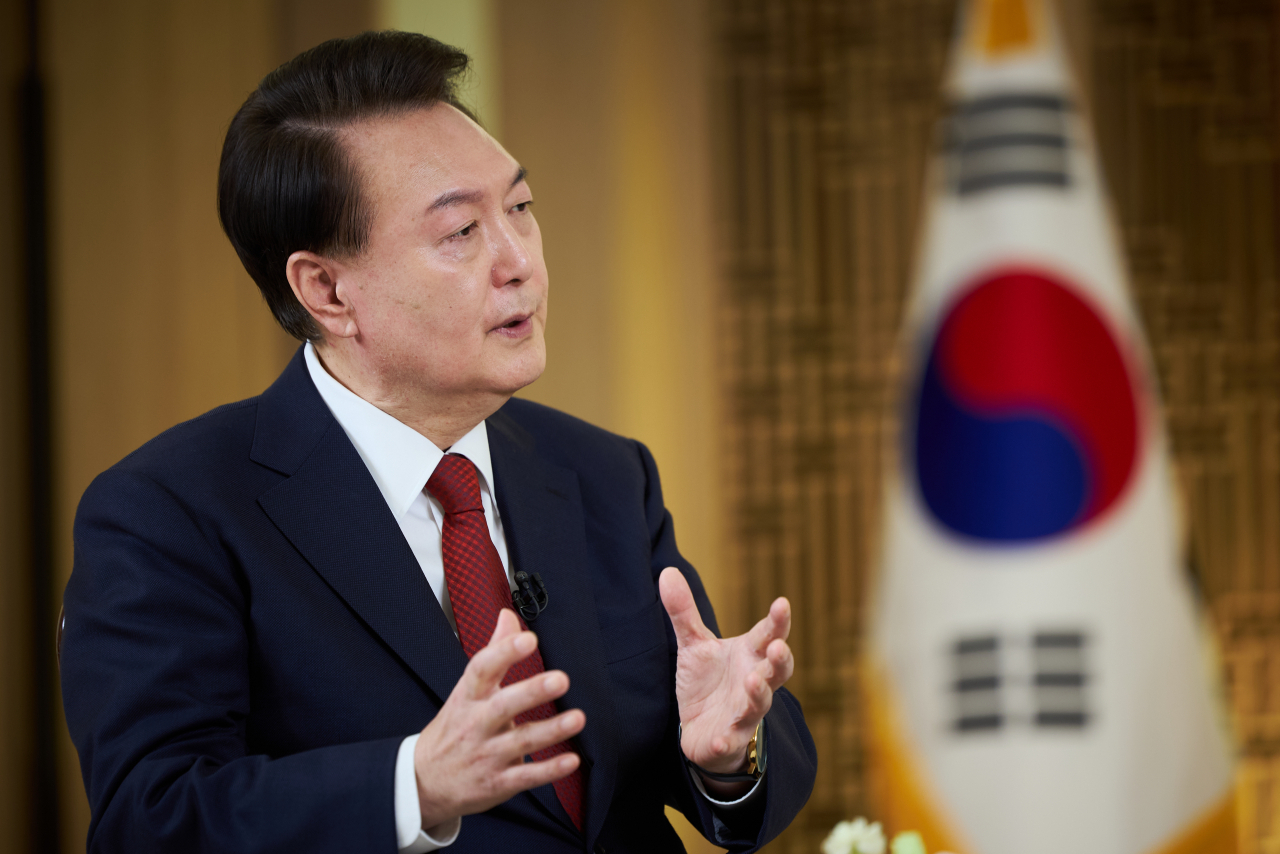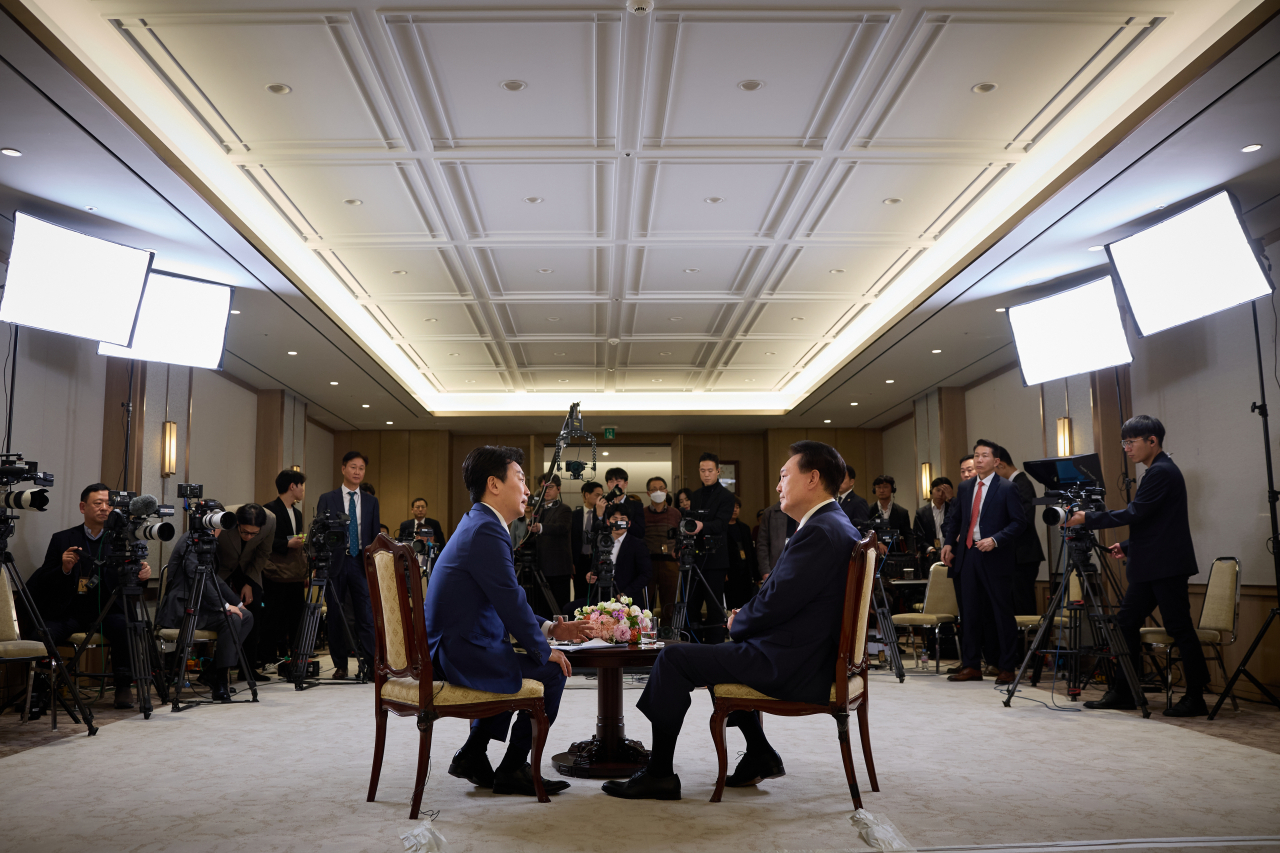 |
President Yoon Suk Yeol is seen at the presidential office in Yongsan-gu, Seoul, as his one-on-one interview with state-run broadcaster Korea Broadcasting System was televised at 10 p.m. on Wednesday. The interview, recorded Sunday, revolved around domestic affairs including graft allegations involving first lady Kim Keon Hee and foreign affairs such as relations with the United States, Japan, China and North Korea. (Presidential office) |
President Yoon Suk Yeol's public characterization of the nuclear-armed North Korean regime as an "irrational force," coupled with his emphasis on the imperative of bolstering defense readiness against threats posed by the regime, signals a further tumultuous path for inter-Korean relations.
The conservative president's prerecorded interview with the state-run Korea Broadcasting System aired Wednesday night amid simmering tensions on the Korean Peninsula, in the face of North Korean leader Kim Jong-un's aggressive rhetoric directly targeting South Korea and his designation of inter-Korean ties as "belligerent."
Yoon told KBS the North Korean regime should be seen as a group of unstable actors, echoing remarks on Jan. 31 at a pan-governmental defense strategy meeting, on the grounds that Pyongyang had deemed a preemptive nuclear attack to be constitutional.
"Would anyone believe that the North Korean regime is a rational force?" Yoon posed at the interview that was recorded Sunday at his office in Seoul. "A state driven by rational and reasonable thoughts would never develop nuclear weapons at the cost of its national economic growth."
Yoon also emphasized the critical need to bolster national security, underlining the presumption that the North Korean leadership could arrive at "unreasonable and irrational conclusions" in their issuance of threats and provocations against South Korea.
For the sake of its people's livelihoods, North Korea should work to improve its national economy and stop developing nuclear weapons, he said, adding that it otherwise should be seen as an irrational force.
Inter-Korean relations have already hit the lowest ebb as North Korea has continued military provocations since the beginning of the year. Notably, North Korea fired approximately 350 shells toward the disputed inter-Korean western maritime border for three consecutive days from January 5 to 7.
On Thursday, the North's state-run Korean Central News Agency announced that the regime had scrapped the law supporting inter-Korean economic cooperation and Kumgangsan tourism at the Standing Committee of the Supreme People's Assembly on Wednesday.
The move falls in line with calls from the North Korean leader's recent rhetoric.
In his key policy speech in mid-January, Kim ordered to designate South Korea as the "primary foe and invariable principal enemy" in the country's constitution. Kim also emphasized the need to specify in the country's constitution the issue of "completely occupying, subjugating, and reclaiming" South Korea, proposing its incorporation as part of North Korean territory in the event of a peninsula war.
Kim has openly defined inter-Korean relations as "hostile" and "belligerent" in his public speeches since late December last year.
In the interview, Yoon remarked that North Korea's characterization of inter-Korean relations as between two hostile states represented a "significant change."
However, Yoon clarified that he refrained from drawing conclusions regarding the reasons behind North Korea's policy shift solely based on North Korea's public rhetoric. Instead, he emphasized his intention to develop a response strategy based on a thorough analysis of North Korea's overall situation, including military capabilities, economic situation, and scientific and technological capabilities.
 |
President Yoon Suk Yeol (right) is seen at the presidential office in Yongsan-gu, Seoul, as his one-on-one interview with state-run broadcaster Korea Broadcasting System was televised at 10 p.m. on Wednesday. The interview, recorded Sunday, revolved around domestic affairs including graft allegations involving first lady Kim Keon Hee and foreign affairs such as relations with the United States, Japan, China and North Korea. (Presidential office) |
When asked about the possibility of holding a summit with North Korea, Yoon clarified that he opposed holding inter-Korean summits solely for the sake of display or political symbolism.
Yoon added that previous inter-Korean summits by three former Presidents Kim Dae-jung, Roh Moo-hyun and Moon Jae-in "bore no fruit," while saying holding a summit without working-level exchanges between the two Koreas is "pretentious."
Yoon called for a "bottom-up approach" to have the summit properly play a role in improving inter-Korean ties, opposing to relying on a "top-down approach."
"Inter-Korean summits remain a possibility regardless of North Korea's stance on nuclear disarmament. But establishing humanitarian cooperation and fostering bilateral relationships should be prerequisites to that end," Yoon said
Yoon also said that he was willing to provide North Korean people under the Kim Jong-un regime with humanitarian aid in order to help protect their basic rights and ensure human dignity.
Yoon also ruled out the possibility of South Korea's nuclear armament in order not to violate the international Nonproliferation Treaty, although he added that South Korea has the capacity to do so.
The president, however, did not comment on the chances of Chinese President Xi Jinping visiting South Korea this year when asked about it. Yoon's office sought talks with Xi in 2023 in hopes that China could play a constructive role amid emboldening ties between Pyongyang and Moscow. Instead, Yoon said Seoul "does not have much to be concerned about" regarding its relationship with Beijing.
As for South Korea's relations with the United States, which will hold congressional and presidential elections in November, Yoon believed any election scenario would have little impact on the alliance between Seoul and Washington that has laid the foundation for the country to deal with the North.
"I felt that (Republicans and Democrats in the US Congress) are not much different when it comes to their stance in international affairs," Yoon said, when asked if he anticipates a change in South Korea-US relations if Republican Donald Trump returns to the presidency.
"The South Korea-US relationship is at a juncture where it could be strengthened and upgraded or not (but it won't weaken and become worse). I don't anticipate a big (change)."







![[Today’s K-pop] Blackpink’s Jennie, Lisa invited to Coachella as solo acts](http://res.heraldm.com/phpwas/restmb_idxmake.php?idx=644&simg=/content/image/2024/11/21/20241121050099_0.jpg)